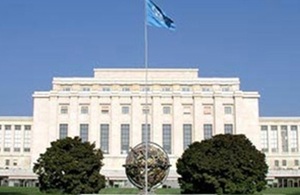UK Intervention at the Conference on Disarmament, Geneva, 29 July to 13 September 2013
UK Ambassador to the Conference on Disarmament, Matthew Rowland, makes his first intervention at Part 3 of the 2013 Conference on Disarmament.

Read the intervention by Matthew Rowland, UK Ambassador to the Conference on Disarmament
Thank you Mr President
This is my first intervention as UK Ambassador and the first time that I am taking the floor under your Presidency. Let me congratulate you on assuming the role and assure you and your team of my delegation’s full support in seeking the effective functioning of the Conference. I would like to say a few words before addressing the issues in front of us. I promise I will be brief.
Let me start by saying that a change in ambassador does not signal any change in UK policy:
- The UK remains committed to a step by step approach to achieving a world free of nuclear weapons, and to following up the Non-Proliferation Treaty (NPT) 2010 Action Plan.
- We take seriously our disarmament obligations, towards which we have made concrete progress. We do not see replacing our minimum deterrent as being inconsistent with these obligations.
- In this forum, we remain committed to engaging on all four of the Conference’s core issues, placing highest priority on the negotiation of a verifiable Fissile Material Cut-Off Treaty.
Next, I know I have a lot to learn from colleagues. But two observations have struck me as I have prepared for this position. First, for all the frustrations of this forum, it is difficult to envisage an alternative that would be better fitted for the purpose of negotiating global disarmament.
- Nuclear weapons are so intimately tied up with the security perceptions of so many states, whether they possess nuclear weapons or not, that any forum for negotiating measures to advance global disarmament must be multilateral and must take decisions by consensus
- This is not to say that other fora with different configurations and procedures cannot make positive contributions where they complement the work of this Conference, such as the technical contribution that we hope the Group of Government Experts on the FMCT will make.
- But we must recognise that we need a forum such as this one and we should do all we can to ensure it regains its relevancy.
My second observation is the importance of timing.
- There is some way to go before we achieve an international environment where no state feels the need to possess nuclear weapons and many of the steps towards achieving that environment will necessarily be taken outside of this forum.
- But this forum must do what it can. It has been close to consensus on beginning negotiations on a Fissile Material Cut-Off Treaty and we should seize upon this and we should act while we can.
- These are relatively benign times. But we cannot rule out deterioration in the international environment for disarmament due to changes in global security dynamics, technological developments or further proliferation.
- I am sure that I am not alone in hoping that in 10 years time those of us in this room will not be judged to have wasted an opportunity to take a step towards our shared goal of a world without nuclear weapons.
Mr President, turning to the issues before us today:
- We are very grateful to you for your efforts to draft a Programme of Work that can find consensus.
- Even at this late stage in the annual cycle, agreement on a programme would send a positive signal to those in the disarmament community beyond this Conference, many of whom we will sit with in the First Committee and who will hold us to account.
- The UK recognises the challenges in securing a Programme of Work and will continue to engage constructively and be open to reforms that improve the Conference’s effectiveness.
- We would support the establishment of a Working Group to examine the elements needed for a consensus Programme of Work
- And we would also welcome the establishment of a Working Group to look at the working methods of the CD including its membership.
My thanks to you Mr President, and to all of you who have given me such a warm welcome. I look forward to working with you all.